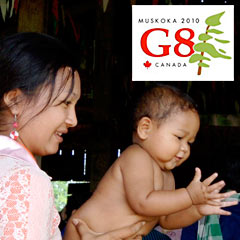Progress made
By Catholic Register Editorial If you look past the crazy billion-dollar price tag, the trampling of civil liberties and the street thuggery that marked the G8 and G20 meetings, it’s possible to see light in the summit tunnel.
If you look past the crazy billion-dollar price tag, the trampling of civil liberties and the street thuggery that marked the G8 and G20 meetings, it’s possible to see light in the summit tunnel.Of course, ignoring the excesses is a challenge. To have almost a billion dollars spent on security and still see gangs of petty criminals terrorizing shopkeepers, torching police cars, smashing windows and drowning out legitimate peaceful protests is beyond scandalous. And to have police, in addition to arresting real criminals, round up hundreds of citizens solely because they lacked the common sense to stay indoors is appalling.
But those are local issues. In the developing world, what mattered from the G8 and G20 summits is the business conducted by world leaders behind closed doors. In that respect, Canada had a good long weekend.
Before the summits, Prime Minister Stephen Harper had committed to making maternal and child health the focal point of the G8 meeting. On that score, he delivered. He anted up $1.1 billion in new money on behalf of Canada and then convinced his G8 partners and six other nations to contribute $5 billion over five years to fund his “Muskoka Initiative.” The total pot will stretch to $7.3 billion when contributions from the United Nations and the Bill Gates Foundation are included.
Government critics and various aid agencies complain that the funding commitment is small compared to the size of the problem. In the developing world each year, an estimated 500,000 women die during pregnancy or in child birth and more than eight million children die before their fifth birthday. The new money will put only a modest dent in those numbers. So, yes, more can — and should — be done.
But $7.3 billion is an impressive amount considering this issue was hardly on anyone’s radar at the start of the year. It became prominent through Canada’s leadership and remained so despite political clamouring at home and abroad to include abortion funding in the initiative. Harper succeeded in keeping abortion out of a program that will focus on pre-natal and delivery services for women, plus nutrition for pregnant women, new mothers, infants and toddlers. The bulk of the money will be spent in sub-Sahara Africa, but also in impoverished nations such as Haiti and Afghanistan. Countless mothers and babies could be saved.
It is one thing, of course, to promise the cash, quite another to deliver. A day after Harper announced his Muskoka Initiative, G20 leaders made a three-year pledge to halve their national deficits. Many of these nations already have a poor record of meeting foreign aid commitments. Now they are being asked to reduce overall spending without breaking new promises to the poor.
That won’t be easy but must be done. Millions of lives depend on it.
Please support The Catholic Register
Unlike many media companies, The Catholic Register has never charged readers for access to the news and information on our website. We want to keep our award-winning journalism as widely available as possible. But we need your help.
For more than 125 years, The Register has been a trusted source of faith-based journalism. By making even a small donation you help ensure our future as an important voice in the Catholic Church. If you support the mission of Catholic journalism, please donate today. Thank you.
DONATE
